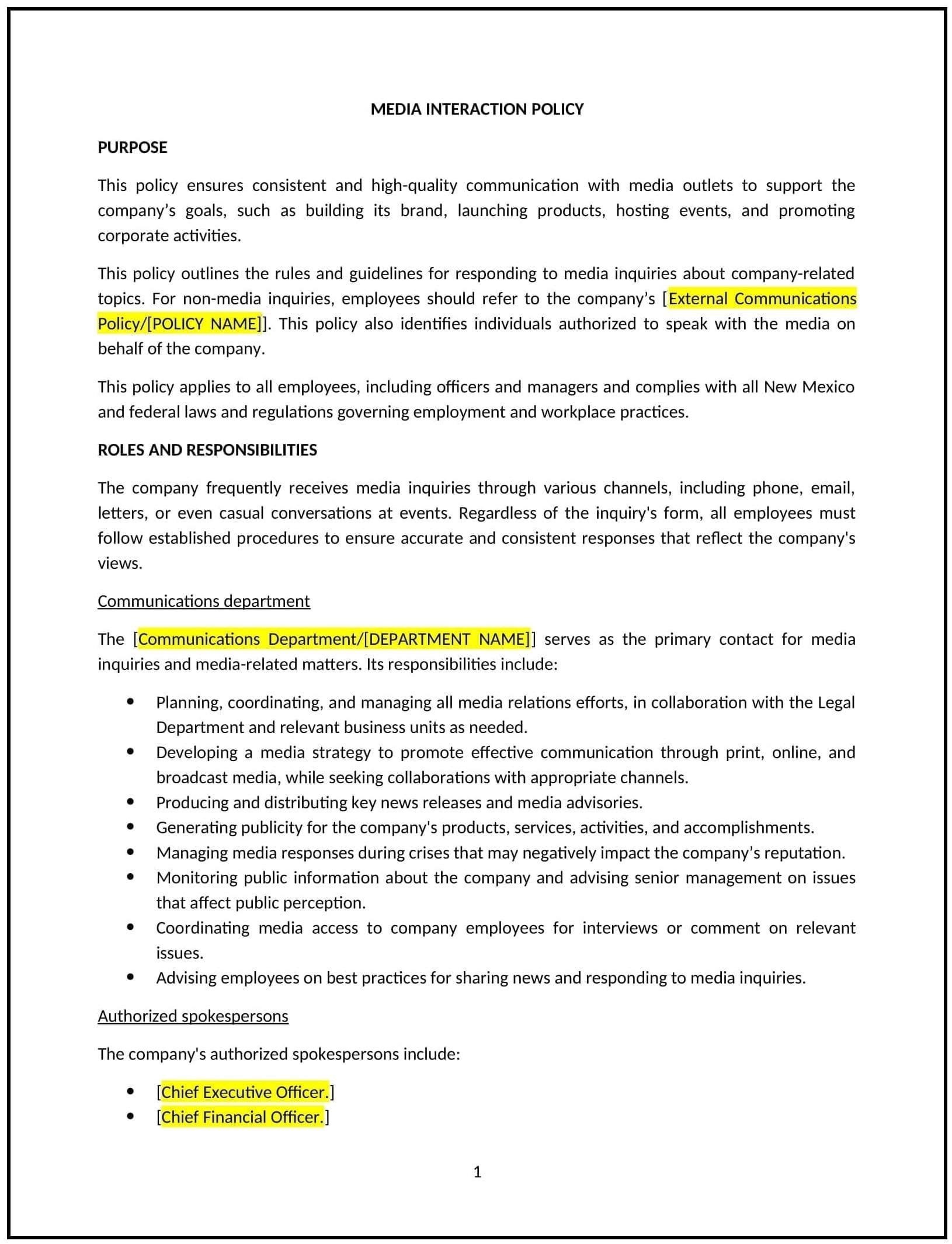Got contracts to review? While you're here for policies, let Cobrief make contract review effortless—start your free review now.

Customize this template for free
Media relations policy (New Mexico)
This media relations policy is designed to help New Mexico businesses effectively manage their interactions with the media, ensuring consistent messaging, protecting the company’s reputation, and maintaining positive relationships with journalists and other media outlets. The policy outlines the procedures for handling media inquiries, issuing press releases, and engaging with the press on behalf of the company.
By adopting this policy, New Mexico businesses can streamline their media interactions, mitigate risks associated with public communications, and ensure that all media messages align with the company’s values and objectives.
How to use this media relations policy (New Mexico)
- Define media interactions: Specify what constitutes a media inquiry, including requests from journalists, bloggers, influencers, and other media representatives. Outline who within the company is authorized to engage with the media and respond to inquiries.
- Establish spokesperson guidelines: Designate specific individuals, such as the CEO, PR manager, or communications director, as the primary spokespeople for the company. Clarify their responsibilities and the type of information they are authorized to share with the media.
- Set protocols for responding to media inquiries: Define the process for handling media requests, including the steps for directing inquiries to the appropriate spokesperson, gathering relevant information, and providing timely responses.
- Guide media engagement: Establish guidelines for issuing press releases, holding press conferences, or participating in interviews. Ensure that all public statements reflect the company’s values, objectives, and legal considerations.
- Reflect New Mexico-specific considerations: Address any state-specific regulations, industry standards, or best practices related to media engagement in New Mexico, including public records laws and other local media requirements.
Benefits of using this media relations policy (New Mexico)
Implementing this policy provides New Mexico businesses with several advantages:
- Protects company reputation: A clear media relations policy helps businesses maintain a positive image by ensuring that all media interactions are consistent, professional, and aligned with company values.
- Promotes effective communication: By outlining clear guidelines for media engagement, businesses can communicate more effectively with the press, ensuring that messages are accurate, timely, and on-brand.
- Reduces legal and reputational risks: The policy helps mitigate the risks of miscommunication or inappropriate statements that could result in legal issues or damage the business’s reputation.
- Improves media relationships: By establishing clear expectations and procedures for interacting with the media, businesses can build and maintain strong, professional relationships with journalists and media outlets.
- Supports crisis management: In times of crisis or controversy, the policy provides a framework for managing media communications and protecting the company from negative publicity.
Tips for using this media relations policy (New Mexico)
- Communicate the policy clearly: Ensure that all employees, especially those in leadership, marketing, and communications roles, are aware of the policy and understand their responsibilities when engaging with the media.
- Appoint a media relations team: Designate a team or individual responsible for managing all media inquiries and communications. This helps ensure that media interactions are consistent and that the company speaks with one unified voice.
- Prepare spokespersons: Provide training for designated spokespeople on how to handle media interviews, respond to difficult questions, and stay on-message. This can help ensure that spokespeople are confident and prepared in any media situation.
- Monitor media coverage: Regularly track and monitor media coverage of the company to stay informed about public perception and address any inaccuracies or negative coverage in a timely manner.
- Review the policy regularly: Regularly review the media relations policy to ensure it remains up-to-date with changes in New Mexico laws, industry best practices, and the evolving needs of the business.